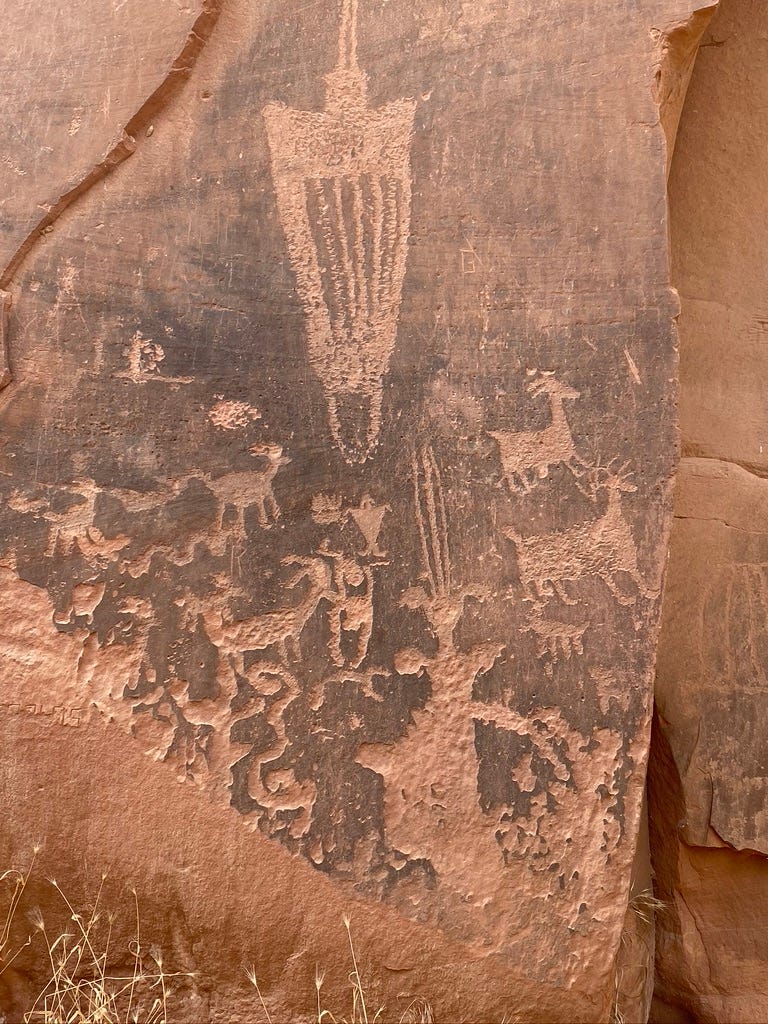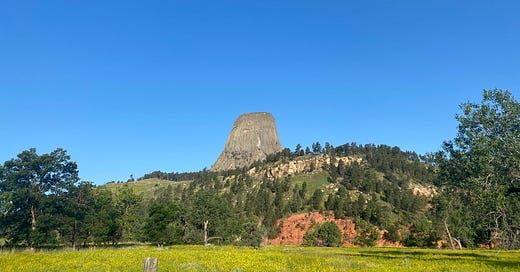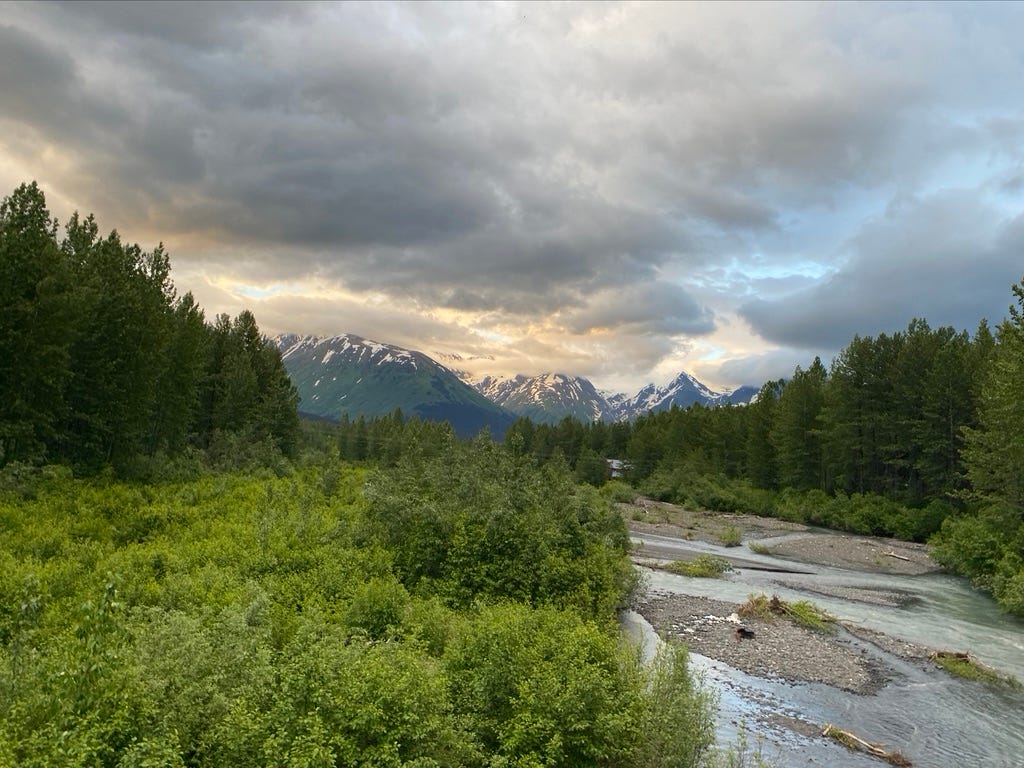We Do Not Understand Our Place In The Universe And Have Not The Courage To Admit It
Thoughts on travel and animal ways of knowing.
In Wyoming the other night, as the evening reddened near Devil’s Tower, I hit an animal with my car for the first time that I’m aware of. A small bird that dipped right in front of me as I was changing lanes, a death confirmed in the rear view mirror. It rattled me all night—a half a second’s pause or hurry on either of our parts and things might have been other than they were. (Or maybe not. “You know what date is on this coin?” Anton Chigurh asks the gas station attendant whose life hangs on a coin flip in No Country for Old Men. “Nineteen fifty-eight. It's been traveling twenty-two years to get here. And now it's here. And it's either heads or tails, and you have to say. Call it.”)
Anyway we don’t treat bugs like animals even though there’s not much else they could be. I’ve certainly hit plenty of those. By midmorning each day of this road trip we had killed our fair share. A constellation of grasshoppers and butterflies and mosquitos painted on the windshield, the grill, the cartop carrier.
I say this because living with a dog has made roadkill harder for me to cope with. And driving around for a whole month you end up seeing so much of it. Some is so far gone that it barely retains any sense of being animal, but I am struck by how much of it seems barely damaged at all. A whole coyote in repose. The first two badgers I’ve ever seen, a few hundred miles apart, completely intact in positions of surrender. Deer and skunks and turkeys and raccoons. All manner of things I never thought I’d feel so much sympathy for. So much devastation.
And nothing feels more detached from that world of animal lives than bombing straight through the center of it in a climate controlled missile. I love road trips, love the act of driving, love the opportunity it presents me to go see new places and people and wonders. But man, it is an alien act; I mean that. Looking at the size of the trucks on the road these days it’s hard not to draw the conclusion that people are buying them to insulate themselves from consequence, from responsibility to others—which is to say to dehumanize themselves completely, to live as something apart from their fellow creatures. The arms race to make individual drivers more safe and secure, or at least to feel that way—bigger trucks, brighter headlights, fancier on-screen technology—also tends to make everyone else on the road less safe. One of those things that’s only a contradiction if you’re able to take a step back from the zealous religion of the individual that supercedes all else in this country.
Barry Holstun Lopez writes in his excellent Of Wolves and Men that
…the scope, the casual irresponsibility, and the cruelty of wolf killing is something else. I do not think it comes from some base, atavistic urge, though that may be a part of it. I think it is that we simply do not understand our place in the universe and have not the courage to admit it.
I can’t live in a way that requires me to believe that humans are the planet’s primary and definitional species. With each passing day I am becoming more and more certain that my project, for now, is to practice new ways of seeing the world. Or at least imagine them, by reminding myself that my way of existing is not some ultimate truth but a very narrow and limited one.
I think most other things are downstream of this. The work of caring, of organizing, of teaching. The work of deepening my relationships with my wife, my dog, my friends, my neighbors. The work of learning new skills like pottery or gardening or beekeeping. All of it takes me outside myself and into something else, which is, ironically, the best way I know of improving myself.
In other seasons of my life, recent ones, this process of imagining other ways of knowing has been defined for me by plants and by fungi. But lately I have found that I am drawn to the idea of the animal more than the fungal or botanical. Visiting that wolf sanctuary back in May has cracked something open in me that I hope is never mended, and as a result I find myself pleasantly mystified by the practice of thinking about the ways other animals move through the world, the ways they spend their time in it.
Lopez again:
We who have largely lost contact with wild animals, have indeed gone to lengths to distinguish ourselves from them, can easily miss the significance of such a view of the human world in which the natural world is so deeply reflected. The view is fully integrated. It produces, often, an utter calm, a sense of belonging.
It is this need, I think, that people most wish to articulate when they speak of “a return to the earth.”
That integration feels lost to us now, but it wasn’t always. In Moab, on the first week of our trip, I got to stand in front of the Moonflower Canyon petroglyphs, likely carved more than seven thousand years ago, in which human and animal forms blend and blur. Humans in other ages have understood that people are just another kind of animal, or that animals are just other kinds of people. I think it is still possible for us to understand the same.

In moments like these, I find myself resentful of the built world, of concrete and steel, of gas stations and casinos and signs for cheap kratom. I am not planning a return to primitivism any time soon—if misery is the defining characteristic of life under industrial capitalism then hypocrisy is probably a close second—but it does highlight for me the importance of getting outside, of being quiet and still and observant. It is in these moments, where I try to exist as an animal does, that I learn the most about what it means to be human.
Thanks, as always, for reading. I’ll talk to you next week.
-Chuck
PS - If you liked what you read here, why not subscribe and get this newsletter delivered to your inbox each week? It’s free and always will be, although there is a voluntary paid subscription option if you’d like to support Tabs Open that way.






Great article! I always say that we pave over their homes and then run them down with our cars! 😥 I loved the pictures that were appearing during quarantine of all the animals coming out of hiding into the world as we the predators stayed hidden at home. 🤔
Thanks for this. Just the other day, at a used bookstore in Annapolis, I saw a copy of Barry Lopez's first book (I think) -- "Desert Notes." I should've bought it, but the store was charging a lot for it. It was a really nice first edition, though I don't think they ever made a second or third edition. Anyways, I flipped through and saw that the introduction was written by Thomas Merton. What a dream combination! Can you imagine those two thinkers just sharing thoughts together? Appreciate you and your words.